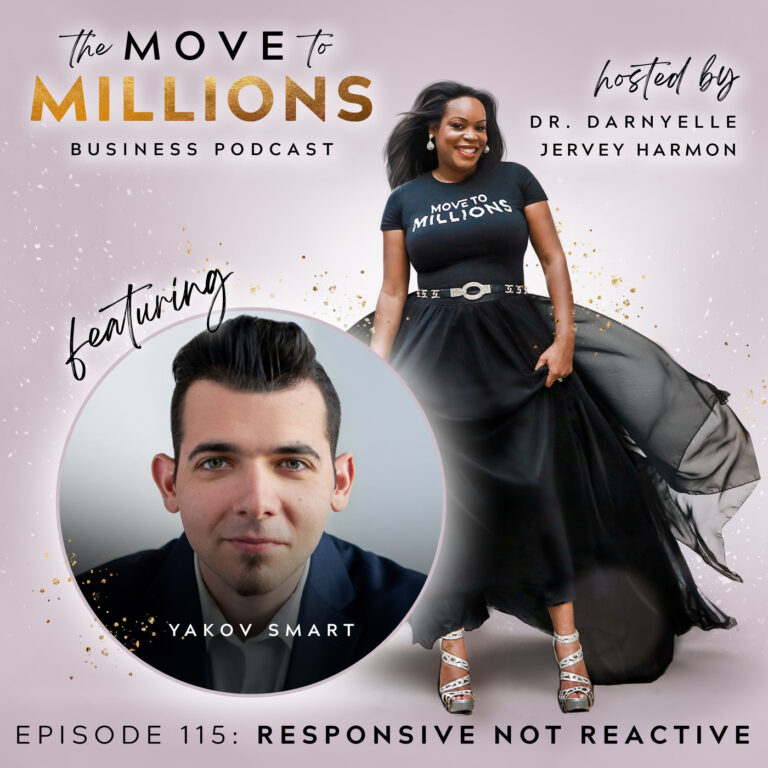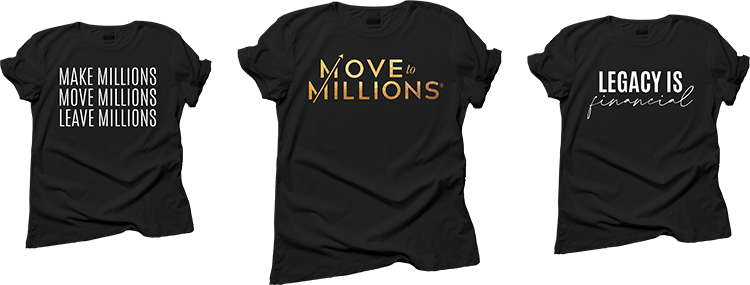“The best thing you could do for your business is to become responsive not reactive when it comes to building relationships.” Yakov Smart
About Our Guest: Yakov Smart is known as the leading authority when it comes to attracting clients through Dream Referral Relationships. Yakov grew his business from zero to multiple six-figures as a direct result of building his Dream Referral Network. He’s also been booked to speak on numerous stages, received thousands of dollars in free publicity and had business owners from across the world attend his seminars all thanks to Dream Referral Relationships. This led to Yakov creating The Connect & Profit System, a system any business owner or thought leader can use to attract their dream clients and grow their revenue by building their Dream Referral Network like he has.
Episode Summary:
This episode is powered by the Move to Millions Method
If your business isn’t on the trajectory to millions, it’s likely because you’ve been more reactive than responsive to what is happening in your business specifically around relationships that bring you dream referrals. This episode is your get out of jail free card because I sit down with Yakov Smart and while we talk about many things, he lays out a blueprint to your next level of leveraging relationships to scale your business. Grab a pen and paper and listen is to discover:
- How to deal with the anxiety of getting rejected
- A 5-step process for delivering undeniable value to partners and referrals
- What assets you’ll need to develop to maximize your success
- How to create turnkey relationships to unlock dream referrals
Last Book Yakov Read: The Truth A Uncomfortable Book About Relationships, Neil Strauss
Favorite Quote: “Control=power=responsibility.”
Tool Yakov Swears by To Move to Millions: Otter.ai
How to Connect with Yakov Smart
Website:
https://connectandprofit.co/
Free Gift: https://connectandprofit.co/incrediblefactor/
Facebook:
https://www.facebook.com/Connect-Profit-107597021373357
Incredible One Enterprises, LLC is not responsible for the content and information delivered during the podcast interview by any guest. As always, we suggest that you conduct your own due diligence regarding any proclamations by podcast guests. Incredible One Enterprises, LLC is providing the podcast for informational purposes only.
Want more of Darnyelle?
Partner With Us To Scale Your Company
Join the Move to Millions Facebook Group
Social Media Links:
- http://www.instagram.com/darnyellejerveyharmon
- http://www.facebook.com/darnyellejerveyharmon
- http://www.twitter.com/darnyellejervey
- http://www.linkedin.com/in/darnyellejerveyharmon
Subscribe to the Move to Millions Podcast:
Listen on iTunes
Listen on Google Play
Listen on Stitcher
Listen on iHeartRadio
Listen on Pandora
Leave us a review
Are you subscribed to my podcast? If you’re not, I want to encourage you to do that today. I don’t want you to miss an episode. I’m adding a bunch of bonus episodes to the mix and if you’re not subscribed there’s a good chance you’ll miss out on those.
Now if you’re feeling extra loving, I would be really grateful if you left me a review over on iTunes, too. Those reviews help other people find my podcast and they’re also fun for me to go in and read. Just click here to review, select “Ratings and Reviews” and “Write a Review” and let me know what your favorite part of the podcast is. Thank you!
****
In this episode, I chat with Yakov Smart. There are many powerful things that Yakov said, but the one thing that I wrote down that I wanted to be able to share with you is that when it comes to building relationships, we must be responsive and not reactive. I hope that made you realize that you need pen and paper handy because it’s going to be such an amazing interview. Let me share a quick bio on Yakov. He is considered to be the leading expert when it comes to attracting A-list mentors and raising capital using LinkedIn. He’s the author of Disrupting LinkedIn and a sought-after authority by top business owners and sales leaders worldwide. Yakov has shared the stage with Samantha DeBianchi of Bravo’s hit TV show, Million Dollar Listing, and has been a guest on numerous outlets.
This conversation was straight fire. My favorite part of our conversation was one of the tangents that we went off on when we were talking about value and worth and how we as grown-ups, as entrepreneurs, and CEOs of our own companies are still plagued by what our parents had told us when we were children. I am not going to steal the thunder of that particular piece of our conversation.
We also talked specifically about how to build relationships with dream partners, and how to avoid the approach anxiety that most people feel when it’s time to find their next set of partners. If you are ready to finally build relationships with dream partners who can bring you an influx consistently of your most ideal clients, grab that pen and paper as we jump into my interview with Yakov Smart.
—
Welcome to the show, Yakov. How are you?
I’m doing amazing. How are you?
I am good. I’m looking forward to this conversation. When we spoke previously, I was excited because I don’t know a lot of people talking about investors and getting investors. I know that it’s a powerful way to move your business to the next level. Before we go there and I get ahead of myself, why don’t you take a quick moment and tell everybody who you are in your own words?
We can talk about the raising capital side. It’s interesting because there are a couple of sides to my business now that we work with people on. There’s the raising capital side, which is relevant for some entrepreneurs but not for others. On the broader scale, there’s connect and profit, which is all about creating partnerships and relationships through LinkedIn and other sources that create revenue for businesses. I grew up always wanting to be an entrepreneur where I’d have my own business.
It was fascinating to me when I was getting started the level of potential and opportunity in most businesses for attracting clients. What I quickly realized and you probably have as well is that a lot of small business owners depend on almost exclusively word of mouth for growing their businesses and generating leads. I was fascinated at how much frustration and shooting there was from business owners on setting up lead gen systems, whether it was marketing or advertising and doing these things. There was a lot of reluctance to it.
Part of my passion is in showing people how to bridge that gap through developing dream referral relationships and being able to do that. What I like to tell people is they can attract all the clients they want without doing a lot of the marketing and advertising that they think they should and that they secretly resent doing.
One big core value is honoring your commitments.
I want to talk about that. I don’t want the focus of our time together to be about investing or getting investors. When I was looking at what we could talk about, I love the relationship piece and getting the right investors is about relationships. It’s being able to convey who you are in such a way that people are willing to put their “name on the line” to be able to put you in front of someone who could help you. I want to dig into all of that. Understanding the frustration that small business owners have and probably seeing not only this reluctance in your own clients and things that you work with. What has been the common thread that you see is the reason why people don’t build these relationships and leverage them in order to build a system that allows them to constantly have referrals coming in to move their business forward?
It’s digging under the hood, which I love. Why is it that people don’t do it? There are some common themes or commonalities. It starts with having the right mentality because there’s this fear of the unknown. A lot of people will think they’re not ready yet to put themselves out there and build either investor relationships or referral relationships because the other person or the other business seems like they are so much further along. People question what value they have to provide. That’s a big reason. Another reason is called approaching anxiety. It’s the fear of getting rejected. If you put yourself out there, make yourself vulnerable, reach out to someone to build that key relationship and they say, “No, thank you. What if.”
People get into a lot of what-if things in their heads. What if they get laughed at? What if the person rolls their eyes? What if the person tells all the other people how much they suck? It’s 99.9% of the time that none of these things happens but it’s easy to go down the rabbit hole. People psych themselves out. The third piece is people are busy, especially small business owners. They don’t have the right systems in place for creating these relationships.
Some people have had the experience. I know I have when I was starting out. There are lots of networking groups and meetings that people can go to. I used to joke and say, “I hate traditional networking. I hate having to show up in that same room every hour and hear people’s elevator pitches that are so manufactured and fake.” They are usually not sitting in the room, especially if they’re a professional service provider or even a coach, author or consultant, with people who can truly send them multiple potential clients every month.

It’s having those conversations that go nowhere that waste people’s time and energy. We can talk about why a lot of those conversations go nowhere as well. When people think about that and the idea of having to put themselves out there in this way, it can certainly be a little intimidating, especially if they don’t see themselves as people’s people or as extroverts. It is interesting because some of the best connectors and the best relationship builders are introverts. I know for me, there are only so many conversations I want to have in a day. I don’t want to do my thing and flow through the day.
That part right there, Yakov. I’m with you. You said many powerful things. I want to pull back for everyone who’s reading to make sure that they did not miss the nuggets. It’s going to give us even more to dig deeper to get underneath the hood around. The first thing is the mindset, questioning their value. We could do a whole another conversation on that but there are some things that you said that I want to nibble on a little bit. You said, “Often they get approach anxiety as a result of the fear of getting rejected and they start what if-ing.” Honestly, I feel like it doesn’t matter who I talk to. It doesn’t matter the episode. It all comes back to mindset in the way that you see yourself and you see the value that you hold in your particular industry and in the marketplace at large.
It is so important that we take a few minutes and nibble on that because the people that are reading, whether we’re talking about building relationships to find people who can invest in their business idea or a concept, or we’re talking about building relationships that are going to give them a steady stream of referrals that will become clients in their programs through their products and services, it all is going to start with a way that they see themselves in their value. You’ve recognized this problem and decided that you want to solve this problem for people. What are some of the things that you have done to help your clients to not what- if themselves, to get over their approach anxiety, and to see themselves as valuable as others see them?
It starts with being responsive instead of reactive. What I mean by that is doing the work ahead of time to identify who their specific dream referral partners or dream JV partners are. My definition of that is people who can fairly consistently send them three or more potential clients every month. Identifying who those people are, and then taking a minute before you even reach out to anyone or “approach anyone,” asking yourself the question, “What do these people want? What are the ways to add value to these people?” I’ll give you some of those ways, but I want to also touch on this point. When you do the work in advance, when you sit down and think about it, it could take you half an hour and that’s it.
You’ve done it. You’ve got a toolkit. You’ve got different tools. You’ve got different ways that you can convey value to these dream referral sources or dream JV partners, where you know walking into the conversation clearly how to articulate the value that you can provide. They’re instinctive and easy to say. When you do that, it becomes more about them than it does about you, which is important. I always tell people, especially if they’re starting out or unsure of themselves, it’s all about what’s in it for them. If they’re seeing the value for them, that’s what they care about before they even care about you, your accolades, accomplishments, and all that fancy stuff.
Here are a few key ways in any business that you can give value to a dream JV partner, a dream referral partner. Number one is making them look good. Everyone wants to look good. If you got values that you can share with their audience or if you’ve got an offer that can make them look good, they’re all about it. I’ll go through a list of these and we can elaborate on any of these. The second one is giving them another reason to get in front of their customers or to get in front of their unconverted leads. Creating content takes up a lot of bandwidth for people. If you’ve got plug-and-play content that they can share with their folks, it’s a piece of value. It saves them time.
Usually, how things start is how they continue.
Number three goes with making them look good. Are you solving a major challenge for their clients? Can you create something that very clearly solves a problem that their people have? That’s keeping it plugged in because then it becomes very complementary. The fourth thing is, does it create revenue in their business? What I mean by that isn’t necessarily giving someone an affiliate commission or referral commission. It can be in some cases but there are industries like law practices where that’s illegal.
How can you create revenue for the other business? You can send them more clients potentially. You can use someone. You can potentially give them exposure by sharing their stuff on social media or sharing their stuff with your email list, your database, no matter how big it is. Even if you have a small email list, that’s still exposure. That’s still publicity, eyeballs, traction, momentum, all those things that you’re giving them.
The other way to do that is like this show, when it gets in front of more people, people see your business. It builds your trust and credibility as well, which ultimately is going to lead to more revenue for you. Having that formalized affiliate program or referral commission in businesses where that applies is another great way to do it.
This is what people sometimes fail to understand. I see that more as the cherry on top rather than the sundae. Especially if people are in it for the long term, reputation is everything. Especially those dream referral sources. They’re not in it to make a quick dollar. The money’s a good supplement to everything else but if you do those other things and you have that cherry on top, it creates a powerful offer and it’s something that’s easy for them to say yes to. All of a sudden, you’re building and conveying a ton of value for them.
That’s so good. You said so much. I didn’t want to stop you because first and foremost, I know you guys who are going to be reading this episode won’t be able to see Yakov, but he is flowing. I’m not seeing him glance in any other direction. That means he knows what he knows. He’s not looking at any notes. He’s going off the top of his head, which I love. That means he’s got a depth of information, which is why I wanted to share him with all of you.
There are so many good things that you said. Because you were flowing, I want to pull them back again and make sure no one missed the powerful nuggets. The first thing is to be responsive, not reactive. That was so good. I wanted to smack you. If we’re face to face, I would have reached out and touched you because many people are not responsive. They are reacting to everything, which is fear. Fear is why we react because when we have confidence, we prepare. I love that you said, “Do the work in advance.” This is what you said. I don’t even know if you said this but it was so good. “When you do the work in advance, you get a toolkit that you’ll be able to use over and over.” It’s about creating a system that makes your success predictable, which is so powerful.

All of the quick ways that he blurted off that you could add value are important. I think about this. I can’t remember where I first heard this quote or this concept of the givers game. You focus on giving and understanding that there’s a universal law or scripture. There are so many things that talk about when you give, it will be given back to you. The Bible says, “Press down. Shake it together and running over.” There’s something magical, powerful, and momentum that happens when we focus on giving.
The ways that we give, number one is by making them look good. There are a couple of different things in addition to what Yakov has already shared that you can do to make them look good. The most important thing is that you know your stuff. If they present you to their community, their clients, their customers, and you are the best thing since pockets, they are instantly getting in a lift in the way that they’re seeing in their community.
I love this, “Giving them another reason to get in front of their customer.” Presenting them with something that is contrarian but also complementary to whatever they’re offering to them. It becomes like a full-service type of opportunity or like a one-stop shop. If you can get everything you need within a specific community, why would you go anywhere else? Anytime we’re able to think about who we’re looking to partner with and doing that due diligence and research upfront to validate that you can make a difference inside of their community, and then showing up prepared for that opportunity, those relationships are going to be so much stronger.
I also love that you talked about the revenue piece as an afterthought, which I can get behind. If we lead with trying to make money, then we present this desperation energy instead of presenting this energy of community, of connection. It tanks the whole experience. I don’t want to do anything I do just for the money. I want to make an impact first because I know that when I make that impact, I’ll be able to make the income. I love all of that. I didn’t cut you off. I felt like you could keep going in terms of this particular facet. Is there anything else that you would want to share here before we shift and talk about some of the other things that you’ve identified?
There’s one more thing and it’s making their life easier. I’ve been approached by people, you probably have as well, that are all over the place. They’re like, “Let’s do something together. I love your stuff. We’re going to make so much money together,” all that stuff. It’s like, “This is cool. This is interesting but it’s so ambiguous. How do we get started? What are the next steps?” It’s not turnkey for them. Your dream referral sources are busy, regardless of what industry you’re in. They’ve got a team, infrastructure, things that they’re doing already. They don’t have time to figure out how to market you for you. Come with materials and collateral that they can plug and play and save them time. Turnkey is an important role there.
Understand your worth. Sometimes, we’re too humble and don’t take enough time to brag or acknowledge how amazing we are.
I’ve been invited to participate in joint venture types of things and they didn’t have all of the pieces. I’m like, “I don’t have time to be writing solo mailers to my list. I need you to send me something that we can make ours because we don’t have time for that.” It is such an important tip to be able to add that in. When I think back to what you initially said about some of the biggest challenges that you see specifically around that approach anxiety that happens, I love how you laid out this framework that’ll make it very easy to avoid a lot of that anxiety that might show up.
The Bible says this way, “Study to show yourself approved.” When I think about this as business owners that want to partner and build these dream referral networks, we’ve got a study to show ourselves approved. Let’s talk a little bit about what does that looks like? What is my study? I want to look at a study from the angle of the person I’m approaching as opposed to studying from the angle of who I am.
We’re going to assume that I know who I am. I know my stuff for this particular question. What do I need to learn about my potential partner to be able to present myself in such a way that when I show up to make them look good and to add value and bring something they’re not currently offering to their community? I’m making them a godfather offer. I’m giving them an offer they can’t refuse. What are some of the things I need to research and know about them before we get started?
The very first research stage is who are you even approaching because if you’re not approaching the right people, they’re going to end up wasting a lot of your time and their time. It’s having a clear litmus test. These are going to be different for every type of business. By and large, it’s the list that you build. Let’s say for most people it’s going to be anywhere from 50 to 300 people. There’s a range of potential referral sources. These can include businesses or people, and it varies a little bit by business and industry. Whatever that range is, it’s important.
I’m big on being selective and having quality over quantity. One of the mistakes I’ve made in the past, this mistake happens with a lot of people, it comes from a bit of a lack mindset where they’re like, “Let’s talk to as many people as possible and get things done.” Not really. If it’s not the right fit, you end up wasting time and draining energy. I’d rather talk to fewer people but have a great opportunity for them and for me. That’s a big thing.
The next part of that is when we think about doing the due diligence, researching who they are. There are things you can look for online. You can look to see on their website. A lot of people have similar messaging but what I look for is the communication style. There’s a cool tool out there. I’m not an expert in this tool, but it’s a good framework to at least know. If you understand a little bit of it, it’s a good framework for communicating and understanding people. It’s the BANK assessment. It’s popular. There’s a great book. What’s their style?
You can usually pick up a website copy or LinkedIn copy of what’s important to them as well, how they communicate what they lead with to. That’s a key thing. You can see podcasts that they’ve been on, see if they’ve got any content circulating out there, and understand who you’re communicating with. Also, understand who their audience is and what are the products or services that they’re offering and if they’ve gone out of their way, which a lot of the time they have to make themselves unique.
This also ties into that initial approach. This is another challenge that people have with approaching these dream referral sources or dream JV partners, even with lead generation, in general. As someone who teaches messaging and marketing and has taught it for years, it’s very easy to talk about what happens after the person has raised their hand as if they’re interested? What do you put in the email? Are you telling your story? How do you structure the webinar? The issue is getting them to be interested in the first place.

There are two types of people out there with your prospects. Even with your dream referral sources, there are people who essentially care enough to raise their hand and lean in and want to know more. There’s everyone else who’s drowning in noise out there. Your first goal with the approach is to instantly establish value and connection where they say, “I’m curious. I’ll learn more. This is interesting.” Cutting through the noise is important and understanding who they are is going to allow you to do that.
There are so many things in your due diligence search that you need to look at. I know when we first met, we talked about this. Where do your core values play in the way that you approach them and if you even approach them? I love that you said, “Who are you approaching, building out this list, figuring out what your litmus test is?” Are your core values part of those litmus tests or is that a different layer after they’ve gotten past a certain level? When you think about it from that standpoint, what would you share?
For me, I look at it analytically. There’s an art and a science to it. I know what my business model is. I know who my ideal customers are. Are they truly doing business with those ideal customers? Did they have something that’s at some sort of scale? Where else are they appearing online? If they have three clients and not much of a database or reach, that’s probably not a dream referral source for me. That’s the first thing that I evaluate. Usually, between the website and the initial introductory conversation, you’ll get a feel for their communication style. What’s important to them?
When it comes to the core values, I looked at them a little differently. I don’t necessarily list mine on the website but I know what mine are. That’s part of intentionality for me. Seeing if there’s overlap or if there are any red flags. For me, one of my big core values is honoring my commitments. I would go out of my way to honor a commitment. Let’s say they agree to a meeting and they said, “We’re going to send over X, Y and Z,” and they don’t send it over, that’s a red flag. They’re not honoring their commitment. Usually, how things start is how they continue. That’s what I’ve observed. I don’t know if that answers your question. Core values are very important, but you have to look at the business side of it as well.
That’s why I wanted to get your take on it because, for me, I feel like there is a time and place for it. I don’t think I’m concerned about core values until I know that I even like you. I’m not leading with, “What are their core values?” I’m like, “I like what they’re doing. I can see how what they’re doing is different from what I’m doing even though we might be serving the same audience. I can see how they can add value to my community. I can see how I might add value to their community.”
As I’m starting to go down my tickler list of the things that I’m looking for, then it becomes important if we’re thinking about putting our brands together in some capacity. Even if it’s as slight as a podcast interview or as massive as looking at doing some type of a program or event together, regardless, we’re combining brands. Do I want my brands to be associated with your brand? If something came down the pike, would I be okay with it?
I remember one of my good friends. They had started a business relationship with someone who ended up getting a scandal that happened in the media. This was a big person. This wasn’t a small business and entrepreneur. This was a person that was an influencer before influencers were a thing. They had started building a relationship. This particular person got caught up in a huge scandal. The problem is that my friend and colleague didn’t do their due diligence to validate that their core values were in alignment. If they had done that, they would’ve never been associated with this person.
Some of the best connectors and the best relationship builders are introverts.
They got hooked on, “This person has a big community. It will be a big following.” They led with the money, which we’ve already talked about we don’t recommend people doing. As a result of that, this scandal ensued and their brand got bundled up into the scandal. It almost killed their business because they didn’t do their due diligence.
I’m with you. I don’t think it’s the leading point but at a point in time, we need to be concerned about it and think about the role that it plays. Even in the age of all of the things that are happening inside of my community, I literally ask partners, “Are you Black Lives Matter or All Lives Matter? In my opinion in the whole argument, and I’m not the uber political person, all lives can’t matter if Black lives don’t matter. We could go on a whole another diatribe about the fact that to Black people, some Black lives don’t matter.
In general, I want to make sure I’m in communication with people and I’m connecting with people who think that I can add value. I remember when I worked in corporate America. I tell the story often. I had become a personal banking officer. I worked in a Fortune 500 financial services company. I had become a PBO. They send you through all of these trainings because now you have the potential to manage the efforts of others. This class that they sent us to was called Treating People As Important Individuals. This is a tangent but it’s relevant. In this class, we explored different cultures, nationalities, ethnicities, and all of the things. It was supposed to be a ground of conversation of leveling and community so that we could appreciate each other for our differences, but it went way left.
There was this one exercise that we did where we had to share what we believed to be true about the other races that were present in the room. I was the only Black person. There was a Latino person and an Asian person. The way that the exercise went, we had to share what we believed to be true that other people said about our races and what other people said about our races. We had two boards. On one page, you write everything that you believed. I wrote intelligent, beautiful, athletic, inventors, creative, and all the positive attributes.
On the other board, you write everything that you had heard others say about your race that wasn’t necessarily positive. It had all of the negative stuff on there. As a collective, we went around and put stickers on the attributes that we believed to be true about the other races. This is such a terrible exercise. When it’s now time for the breakout, I’m looking at my boards. The only positive attributes that have dots are the ones that I put. Everybody else who’s in the room with me doesn’t think I’m intelligent or my people are intelligent and creative.
I went off. Not to take anything away from all of the people who have lost their lives inside of our community. As of late, with everything that was going on in 2020, but I literally went off. I was working for a company where the people that I worked with every single day didn’t think that I was smart and could add value. Still to this day, it’s important to me to know that if you’re going to present me to your community and vice versa, you’re not just doing it because of the potential gain that can come from it, you’re doing it because you see the value that I present as an individual.
I do think that core values play a part. To your point about litmus tests, everybody needs to determine the point at which it plays the most part for them. If we’re looking at partnership and marrying brands together, we have to think about that. You’re a cute guy but I’m not walking up to you on the streets of Phoenix, Arizona saying, “You want to go to the Justice of the Peace and get married?” I’m not going to do it. I’m going to get to know you first. Let’s at least go on a date. Can you buy me dinner before we do that? I’m making fun but at the same time, I want to make sure that as we’re talking about this process and looking at how to present yourselves to potential partners, you’re looking at the potential partner of being worthy of being associated with you too. That’s the point that I was trying to make.

It’s a great point. It’s understanding your worth. That’s what it comes down to. A lot of people, especially entrepreneurs, we devalue ourselves. I’m curious to hear your thoughts on this too. We say, “It’s the little old me. I’m only doing these little things.” From the outside looking in, someone says, “You’re doing all those things? It’s crazy. You’re brilliant.” Sometimes we’re too humble. We don’t take enough time to brag or acknowledge how amazing we are.
A lot of it depends on how we were raised. Most of us inherited these ways of being from where we came from. If you grew up in a family where you were the ostentatious child and you were constantly silenced, “Sit down. Stop that. You can’t do that.” In one of our mastermind retreats, one of my clients was talking about her niece. Her mom was trying to get her to sing her ABCs for everyone. She was like 3 or 4 or something like that. It’s massive that she could do her ABCs because it was before her time. She starts to do the ABCs, but she’s doing it her way. The mom says, “Stop that. Do it right.”
I say that to say that many of us were falsely humble or we don’t know how to honor who we are and our values and what we bring to the table because we were silenced as children. We were told that it’s not okay to toot our own horn and to share or exploit what it is about us that makes us great. That’s the biggest disservice that could have ever been done to us because those little people who were silenced grow up to be entrepreneurs. Entrepreneurs who undercharge. They don’t think that they are on the same level of people that they’re better than. It breeds this whole cycle, that rabbit hole that you talked about earlier that prevents us from being able to be the change we want to be in the world and to transform at the level that we were all born to do so.
It’s bothersome to me. I try my best, as a part of my work and with my clients and the things that I do inside of my community to make sure that I’m creating a space and an environment for people to know that greatness is celebrated here. It’s okay to toot your own horn. In fact, I want you to tell me what makes him great. I don’t want to have to figure it out perhaps perchance. I want you to actually tell me. It does make a big difference.
We’re very much in alignment there. It’s about sharing and how we show up. In my background, I had the whole former Soviet Union upbringing. That’s where my family came from. There, if you speak out or don’t do it right, someone can come in the middle of the night and take you away. That was their conditioning. It was interesting over the years, I’ve noticed why it’s like, “Don’t stand down. Don’t go against the grain.” Here I am with this wonderful opportunity to stand out and shine. That’s one of the great gifts of business and sharing or creating content like this.
It’s amazing what we’ve been through and how it shows up in our businesses as entrepreneurs. Those of us who are lucky to either throw our own or with the help of coaches, consultants, and mentors get beyond that. We get to be such a service for the world. I think about that Marianne Williamson poem, Our Deepest Fear. That part on the back end when she says, “When you let your light shine, you unconsciously give others permission to do the same.” I feel like we do humanity a disservice to be humble. I don’t like that word. I almost always want to scream when someone says, “You got to be humble. Where’s your humility?” Much rather be the light so someone else knows that it’s okay for them to shine. That’s the way that I want to show up and how I want to be in the world, which is awesome.
We got off on a tangent, but it was such a good tangent that it was important that we went there. I do want to bring us back as we start to round out our time together. We were talking about your dream referral. You’ve given already many powerful tips and nuggets that people will be able to come back and read to over and over again, and begin the process of strengthening their own positioning of themselves so that they can present themselves in a way that allows the other party to see the value that they bring to the table as well. Is there anything else that you wanted to be able to share that you didn’t get to share?
There’s nothing that I can think of on the top of my mind. The one thing that I do always like to mention when I’m doing podcasts or trainings is knowledge is great, implementation is better. Even if you go out and you try to implement something and it’s not 100% perfect, you’re going to put yourself in the arena and give yourself the opportunity. You’re going to increase your probabilities versus, “This stuff sounds great. I need to do the work. One day, when I reach a certain revenue level or when I enrolled this many more clients, I’m going to start developing this.” The best time to do it is now so you can reach those goals and those targets.
It’s important that we implement. Otherwise, it’s just information. There’s way too much information out there, which gets a lot of us in trouble. I want you guys to make sure that you come back and read this episode. I want you to make sure you have pen and paper because there are many success nuggets that Yakov have already given you. I know he’s got a free training that you can learn more about if you want to get some support around building out dream referral networks, how to be able to do it. I would recommend him based on what I’m learning about him and what I know that he does. This whole interview, he’s been talking to me, which tells me he is a GOAT. He is at the top of his game and what it is that he knows and what he’s able to do for other people.
Before I let you go, I do have a few questions I always like to ask to round out our interview because our conversations don’t always go in the direction of the business. Let’s bring it in a little bit more. Three questions. I’ll give them to you at first and give you an opportunity to answer them one at a time. What is the last book that you read? What is one quote that you live by? What is the tool that you swear by as you continue to move your business to and beyond the million-dollar mark?
The first question is what’s the last book. It’s an interesting book. It’s not going to be everyone’s cup of tea. It’s not a business book. It’s called The Truth: An Uncomfortable Book About Relationships. It’s radical. He shares some esoteric experiences. It’s the character’s journey for discovering who he is in relationships, but it’s also beautiful. He talks about healing inner wounds, and a lot of deep stuff there. It might be some people’s cup of tea or it might not be.
It needs to be everyone’s cup of tea because relationships are universal. There’s nothing you can do on this planet that does not include relating to someone else. If you do have traumas and wounds that have not been resolved, they will impact your ability to go to your next level. We all need to get that book. Who’s it by?
Neil Strauss.
I’m going to add it to my list, for sure. What’s one quote you live by?
I like, “Control equals power equals responsibility.” I don’t know who said it but it’s true.
What is the tool that you swear by?
I’ll give you one that’s cool. It’ll apply to a lot of people especially if they’re creating content. It’s a transcription tool. It’s called Otter.ai. It’s artificial intelligence to transcribes your stuff. It’s super quick, easy and accurate.
I’m glad that we had you here. I’m excited because I feel like people are going to be on a journey to build more powerful relationships with people that will ultimately help them to do the work that they want to do at a greater depth out in the world. Thank you so much for coming and sharing your time and your talent with these amazing people in our community.
Thank you so much for having me.
—
Didn’t I tell you that conversation was a straight fire? It was so good. There are many things that we touched on that made all the difference. I have pages of notes here as I want to break down to talk about some of the things that he said that I loved. We talked a lot about mindset and questioning your value and how to stop doing that. He talked about approach anxiety. I had never even heard of that before Yakov said it, but the fear of getting rejected has probably stumped you in your tracks more times than you care to admit.
What about what if-ing? How many of you have what-if you’re way out of an amazing opportunity to go to your next level? If you’ve been psyching yourself out and you’ve been busy instead of building systems that are going to help you to take your business to the next level through partners, I know you had a great time reading this conversation.
As Yakov said towards the end of our interview, information is great but implementation is better. I hope that you took copious notes. You wrote down exactly what it is you can begin to do differently so that the next time you approach a partner, you are able to stand tall, communicate with confidence, and clearly articulate your value and how you’re going to make a difference for their community.
I’m excited about what’s going to happen for you as you continue to list back to this powerful interview that Yakov and I had. There are many amazing nuggets that were here. I want to thank you guys for hanging out with us and reading this powerful conversation. I want to remind you that right now at this moment, you have it. You are more than enough. You are a gift to any community that you decide to be a part of. Keep that in mind. We’ll chat again soon.
Important Links:
About Yakov Smart
 Yakov Smart is considered to be the leading expert when it comes to attracting A-List investors and raising capital using LinkedIn. He’s the Author of Disrupting LinkedIn and a sought-after authority by top business owners and sales leaders worldwide. Yakov has shared the stage with Samantha Debianci of Bravo’s hit TV show, Million Dollar Listing, and has been a guest on numerous media outlets.
Yakov Smart is considered to be the leading expert when it comes to attracting A-List investors and raising capital using LinkedIn. He’s the Author of Disrupting LinkedIn and a sought-after authority by top business owners and sales leaders worldwide. Yakov has shared the stage with Samantha Debianci of Bravo’s hit TV show, Million Dollar Listing, and has been a guest on numerous media outlets.
A resident of Scottsdale, Arizona, today Yakov is the proud leader of Linked Lead Enterprises, where his webinars, on-demand training programs and strategic consulting accelerators give people proven tools and techniques for transforming their LinkedIn Profiles into priceless, Relationship Building Assets.





